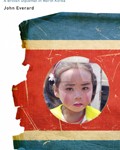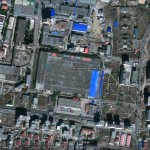Sitting astride rows of buzzing looms and distinguishable from their colleagues by the white make-up heavily applied to their faces, a few dozen North Korean women in a run-down Mongolian clothing factory are busily knitting garments to please minders from their Communist state.
They are part of a North Korean labour force tens-of-thousands strong, put in place across Asia to help the Stalinist regime meet its financial targets. And British consumers are unwittingly filling the dictatorship’s pockets through these workers, an investigation in Mongolia by The Independent and the investigative journalism project WorldView has found.
Sent in their hundreds, under an agreement between Mongolia and the Democratic People’s Republic of Korea (DPRK), the North Korean workers take jobs on construction sites and in factories across this Central Asian state, where they are closely monitored by overseers from their homeland. Some of them were found to be producing goods for popular UK clothing brands such as Edinburgh Woollen Mill (EWM).
“They’re hard workers, they don’t complain and they get stuck in, they’re quite skilled,” said David Woods, a British textiles professional brought on as a specialist at the Eermel clothing factory in the Mongolian capital, Ulan Bator. North Korea has been able to transplant elements of its highly centralised state to Mongolia, where labourers keep to a tight schedule dictated by their embassy for the duration of their three-year contracts. They also have to seek permission to speak to outsiders, unlike their Mongolian co-workers.
Mr Woods showed a reporter a James Pringle-brand cashmere sweater made for EWM with a £140 price-tag already affixed, ahead of shipment to the UK, as he gave a tour of the factory. He described how its 80 female North Korean employees were housed and fed on site under a scheme managed by North Korea’s embassy, earning up to £200 per month.
Another Eermel employee told The Independent that the women’s labour fed the coffers of the North Korean regime, echoing the North Korean practice across Asia where tens of thousands of North Koreans are estimated to be employed on behalf of their government. “We are paying to Korean workers like Mongolians, the same salary,” said Bayar, Eermel’s director for exports, who like many Mongolians uses only one name. “But… we are transferring the money to the account of the [North Korean] embassy. How they split the salary, we don’t know.”
It’s a surprising move for a regime that regularly tries to keep its citizens in the dark about world events and strictly controls access to information at home. The fact that North Korea has allowed so many of its citizens to leave and glimpse the outside world reflects the severe economic situation the country has faced since the collapse of its one-time sponsor, the Soviet Union, and, more recently, international sanctions over its nuclear-weapons programme. It’s also an example of how Pyongyang has been able to adapt and continue profiting from a globalised economy while keeping most of its population at arm’s length.
In Mongolia, the practice goes back to 2004, according to leaked US embassy cables released by WikiLeaks in August. The cables, penned in 2006, describe how a representative of North Korea, who was “extremely professional in both manner and appearance”, approached a Canadian-owned gold mine to offer workers for $1.50 (90p) per day.
Another 2006 cable says: “The working and living conditions of these labourers raise the concern that they are subject to coercion, and are not free to leave their employment… the DPRK workers are monitored closely by ‘minders’ from their government, and many are believed to be subject to DPRK government pressure because of family members left behind in North Korea. The workers reportedly do not routinely receive direct and full salary.”
North Korea watchers warned that the work-abroad programmes should not be seen as a step by Pyongyang towards more openness. “As far as the regime is concerned, sending groups of people to foreign countries where they don’t speak the language and can be sequestered in barracks or factory dorms is a much safer option than granting to foreign investors in North Korea the kind of freedom and mobility they demand,” Brian Myers, a Seoul-based North Korea analyst, said.
The scheme has been hugely successful with businesses in Mongolia, which are attracted by the North Koreans’ rock-bottom labour costs and an unparalleled work ethic. One of the few countries with warm ties to the Stalinist state, Mongolia has increased its quota of North Koreans allowed to work in the country from 2,200 to 3,000 in 2011, according to the Ministry of Labour and Social Welfare.
The workers are even more popular in Russia, where 21,000 laboured in the first quarter of 2010 alone, according to the Russian migration agency. And many more are believed to be working in China, where the statistics are not made public.
Part of that army of workers are the seamstresses at Eermel, a hulking Soviet-era cashmere factory in the Mongolian capital that produces sweaters and other cashmere garments for the EWM retail chain and a number of lesser-known UK labels including Hush, Moray and Brodie. Clothing racks in Germany, Italy, Australia, Japan and beyond are also stocked with Eermel garments, according to Mr Woods. That means international isolation has not stopped North Korea from tapping global consumer markets.
North Korea’s culture of secrecy makes it difficult to get accurate data on the workers’ contract terms. The private interests using its labour force seem to understand that continued co-operation depends on maintaining the code of silence. After a short phone call to the North Korean embassy, Eermel factory officials refused to allow The Independent to interview any of its North Korean employees.
And at the Mongolian foreign ministry, officials were tight-lipped about how much the North Koreans’ labour is worth to Pyongyang in cash transfers, preferring to focus on benefits to the individual labourers. “For the families of the individuals who work [here] that could be helpful,” State Secretary Tsogtbaatar Damdin said. But when asked if he knew what portion of their salaries the North Korean labourers were allowed to keep, he said: “If they owe some commitments to their county we would rather not intervene in that area.”
The deal could be worth over £7m annually to North Korea if the Eermel factory workers’ wages are representative of those across Mongolia. It’s no small sum when compared to North Korea’s gross national product, estimated by the CIA to equal only $40bn in 2008. EWM, for its part, confirmed that it was supplied by the Eermel factory in Mongolia and that there were North Koreans among the workforce there, but said it was told by the factory that the North Koreans’ wages were paid directly to the workers, not the North Korean government.
The Scottish company quoted Eermel as telling it: “We do not pay any commission to the North Korean government, any North Korean Agency or anyone else. We pay the workers directly.” That stands in stark contrast to what The Independent was told by factory officials in Mongolia. But even though their contract terms are secret and are likely in violation of a raft of international agreements on workers’ rights, the practice has its supporters among North Korea watchers. They believe North Koreans working abroad will share their experiences of the outside world when they return home, perhaps in the long run leading to social and political change within the country.
“It’s every North Korean worker’s dream to be selected [to work abroad],” Andrei Lankov, a professor of Korean studies at Kookmin University in Seoul, said. “They cannot make even remotely as much inside North Korea. And on top of that, they are coming back and they bring knowledge about the outside world. They are closely supervised and they have to be very cautious, because their families back in North Korea are essentially hostages, but… this knowledge in the long run is going to change North Korean society.”
There is evidence that the North Korean workers will go to extreme lengths to avoid going home and live in perpetual fear that their minders will make them do so. “I met one man who broke his arm and was hiding it from his superiors for over a month because he was afraid he’d get sent back to North Korea if they found out about it,” said Koh Kwang Sub, a member of the South Korean business community in Ulan Bator. Mr Koh, who owns a local pharmacy, said he was able to meet workers and hand out medical supplies every few weeks when their managers were away. “It would be nice if they could work here and go back home safely, but they have no medical help and sustain a lot of work-related injuries,” he said.
The fully stocked store shelves and proliferation of mobile phones here must come as a surprise to a first-time visitor brought up to think North Korea is the world’s most advanced nation. Has the realisation led many of the workers to try defecting? “I really can’t talk about that,” said Ha Kyeong Yun, a South Korean entrepreneur who employs 30 North Korean army veterans at his farm in the northern Mongolian town of Sharin Gyol. But the answer is probably that very few, if any, have. “Their hierarchy is very rigid. They’re from the military and they maintain their rank relations.”
It’s also no coincidence that all of the male North Korean workers are at least 40-years old. All have families back home who would pay the price for what amounts to a crime against the state under the country’s system of hereditary discipline.
All of this makes the North Koreans very dedicated workers. At Eermel, Mr Woods said he was very proud of the company’s hard-won relationship with EWM and praised the North Korean staff. “Why they come over from North Korea to Mongolia I’m not entirely certain,” he said. “They work hard and we’re happy to have them here.”
A global market
Mongolia The practice of using North Korean workers goes back to at least 2004. A new deal was signed in 2008 that allowed for more than 5,000 workers to come to Mongolia until 2013. There are currently around 3,000 in the country.
Russia There are some 21,000 North Korean workers in the far east of the country, where they work in logging camps. They reportedly have just two rest days a year.
China No reliable statistics exist, but there are thought to be thousands of North Koreans working in China. The numbers in Dandong, a city close to the border, is said to have soared in recent years.



